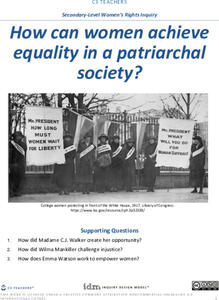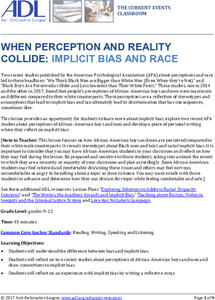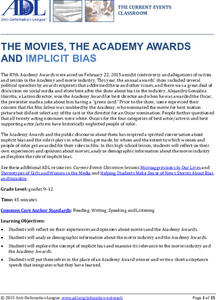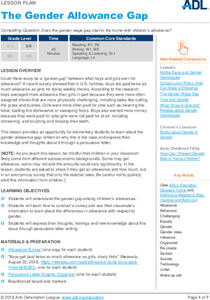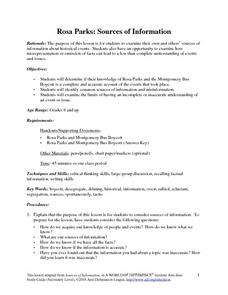Curated OER
Abigail in Childbirth
Childbirth has never been easy and is not without risk, even in the 21st century. Young historians gain insight into the travails of 18th-century childbirth as they read letters between Abigail Adams and her husband about their loss of a...
Curated OER
Abigail as Feminist
Young historians examine a 1778 letter from Abigail Adams to John Thaxter and another from Abigail to her husband John Adams, written in 1776, that reveal her views on the perceived role of women and the laws that governed women's roles....
Curated OER
Abigail as Political and Historical Observer
Lesson five in the series asks scholars to examine letters Abigail Adams wrote about her experiences during American Revolutionary War battles, her thoughts on slavery, and her concerns for her husband.
Curated OER
Abigail and John in Love
The second lesson in the series asks groups to analyze an exchange of love letters between Abigail and John Adams. Scholars identify the many allusions and references in the letters and consider what they can infer about the writers.
Curated OER
Introduction to Abigail Adams
Remember this lady! Abigail Adams, the wife of John Adams, the second President of the United States, and the mother of the sixth president, John Quincy Adams, was much more than a wife and mother. This prolific letter writer is the...
C3 Teachers
Women’s Rights: How Can Women Achieve Equality in a Patriarchal Society?
Women today may not have heard of Madame C.J. Walker or Wilma Mankiller, and a few may not be aware of Emma Watson's current role; however, they have certainly benefited from their efforts. Using questions supplied by this guided...
Anti-Defamation League
When Perception and Reality Collide: Implicit Bias and Race
The big idea in this lesson is that implicit bias often clouds perceptions. High schoolers watch a short video, read research articles, and engage in discussions about implicit bias and how these biases lead to stereotyping. They craft...
Anti-Defamation League
The Movies, the Academy Awards and Implicit Bias
"And the award goes to. . . " High schoolers investigate bias in the movie industry by reading articles, watching a short video, and examining data about the Academy of Motion Picture Arts and Sciences (AMPAS) membership, nominees, and...
Anti-Defamation League
Women’s Inequity in Pay: Could It Be Sexism, Implicit Bias or Both?
Equal pay for equal work? High schoolers research the reasons for the inequity in women's pay. They read articles, examine graphs, engage in discussion, and then craft an essay in which they suggest a way to address the gender wage gap.
Anti-Defamation League
Implicit Bias
Everyone has biases, both explicit—ones we are aware of—and implicit—ones we are unaware of. High schoolers learn the differences between explicit and implicit bias in a short lesson where pupils watch a short video, read articles about...
Anti-Defamation League
Intent vs. Impact: Why Does it Matter?
Contrary to the popular saying, words can hurt. Words matter! Tweens and teens can reflect on how words impact others even if the intent wasn't how the words were perceived. After examining an Instagram post where Lizzo apologized for...
Anti-Defamation League
Microaggressions In Our Lives
Defining, identifying, and learning how to counter microaggression is the lesson's focus for high schoolers. Learners examine a definition of the term, write about their own experiences with microaggression, watch short video examples,...
Anti-Defamation League
Identity and Diversity in My Generation
Gen Z, those born between 1997 and 2012, according to research, is the "most racially and ethnically diverse generation in U.S. history." Gen Z high schoolers are challenged to consider how they identify themselves. They select a photo...
C3 Teachers
Economics of Slavery: How Did Cotton Sow the Seeds of Panic?
An inquiry-based lesson challenges high schoolers to research and identify the economic forces and inventions that impacted the cotton industry. Researchers consider how the use of slavery impacted the economic growth of the United States.
Anti-Defamation League
The Gender Allowance Gap
Does the pay gap begin with allowance? That is the big question scholars answer in a lesson examining how gender affects how much money an individual earns. Class members conduct a survey to identify how the allowance is paid, take their...
Anti-Defamation League
What "Draw-A-Scientist" Reveals about Gender Stereotypes
What do you picture when you hear the word scientist? Challenge scholars to put pencil to paper, draw a scientist, and then reflect on the patterns they observe. Learners read an article about a female scientist and write a story about a...
C3 Teachers
African American Voices and Reconstruction: What Does It Take To Secure Equality?
High schoolers research the 13th, 14th, and 15th Amendments, as well as other primary source documents, to determine Reconstruction's impact on the North and South. The 34-page inquiry-based lesson includes a staging question and...
Anti-Defamation League
Bellen Woodard, Identity, and “Crayon Activism”
Scholars learn about a young child turn activist and author, Bellen Woodard. Learners discuss identity, the importance of representation, and how activism makes a difference. Small groups brainstorm ways to create change and the steps to...
Anti-Defamation League
Identity, Hair and Seeing Myself
Scholars read about and discuss how seven-year-old Morgan Bugg wrote a company to add avatar styles that reflect her. The company realized its error and added more inclusive styles to its avatars. Learners reflect on identity, what...
Anti-Defamation League
Sneakers and Prejudice: Letters to Challenge Bias
After learning that NBA player Stephen Curry's shoes only come in boys' sizes, Riley wrote a letter sharing her concern, highlighting the gender bias and inviting Curry to take action. Scholars view a news clip, review the letters,...
Anti-Defamation League
Job Roles without Gender Boundaries
A lesson examines gender stereotypes and how they relate to career choices. Small groups look closely at job titles, identify gender bias, and brainstorm ways to add inclusivity. Individuals reflect on their interests and future career...
C3 Teachers
African Americans and the Civil War: How Did African Americans Experience the Civil War?
To understand African Americans' involvement in the United States Civil War, high schoolers gather evidence from primary source images, census reports, and documents. As a summative performance task, individuals craft an argument,...
C3 Teachers
Anna - One Woman’s Quest for Freedom: What Did Freedom Mean for Anna?
The 2018 film Anna, One Woman's Quest for Freedom in Early Washington, D.C., offers high schoolers an opportunity to examine the sacrifices one woman endured to gain her freedom from slavery.
Anti-Defamation League
Rosa Parks: Sources of Information
Young scholars show what they know about Rosa Parks and the incident on one of the buses in Montgomery, Alabama. Groups discuss and identify where they receive most of their information. They examine the importance of having a complete...







